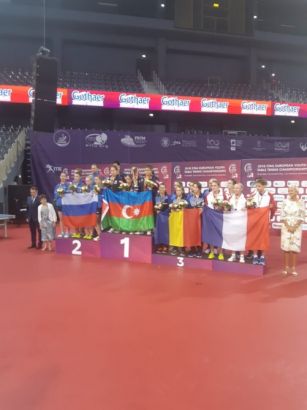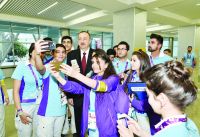Font size:


06.10.2012 05:04 | Readed: 1973
We, politicians, scientists and representatives of culture, education and mass media from around the world, assembled in Baku on 4-5 October 2012 at the International Humanitarian Forum,
guided by the United Nations Millennium Declaration and recognizing the need to bring justice to the process of globalization;
calling on the political and scientific elite and influential international structures to pay constant attention to humanitarian problems in the dynamically developing global society;
noting that progress in science and technology in the modern era is leading to the deep transformation of mankind, society and civilization as a whole;
paying heed to the need to review such aspects of humanitarian problems as:
Humanitarian aspects of economic development
Converging technologies and outlines of the future
Modern mass media and new challenges
Traditional system of values in a post-modernist culture
New methodological approaches to the processes of globalization in the 21st century
Technologies, changing a view on modern medicine, and molecular biology
Multiculturalism and cultural self-consciousness
Multiculturalism in the life of a society
realizing that sustainable economic development requires a new quality of human capital and is impossible without taking account of the human factor in its entirety;
aware that we live in an era of global change, rapid scientific development and converging technologies;
recognizing that today's technology is able to change radically not only international politics, society and national cultures but the human phenomenon itself;
considering that the growing role of the mass media and social networks in the life of modern society demands the evaluation of a range of new problems;
emphasizing that in the prevailing situation the link between mankind and culture is decisive for the whole of mankind;
noting that post-modernist criteria, a review of values, stereotypes and the universals of the modern are characteristic of the changing cultural context;
taking account of all new aspects of globalization and their influence on social and socio-cultural processes;
paying heed to the fact that technologies, changing the view of modern medicine and molecular biology, closely linked with the application of bio-, nano- and information-technologies and touching on the nature of man himself, bring urgently to the fore the issue of new humanitarian ethics;
aware of the need for new interpretations of multiculturalism in conditions of globalization and considering it the most effective instrument to encourage the growing cultural variety and the formation of intercultural dialogue;
consider it necessary to note the great effectiveness of the discussions at the forum on a whole range of humanitarian problems, caused by globalization, the development of science and technology and affirmation of the rights of the information society;
think that the comprehensive, multi-level dialogue during the Baku Humanitarian Forum gives hope for the potential for an effective response to the current challenges of our time;
note the ever-growing importance of a rethink of the conception of multiculturalism and its role in modern society;
emphasize the need to use the opportunities of multiculturalism as a component of state policy and its significance both for the development of different cultures, and for the preservation and increase of the cultural achievements of all humanity;
pay especial heed to the need for further elaboration of philosophical and ethical aspects of the problems of multiculturalism alongside their appropriate coverage in the mass media in order to prevent xenophobia, racism and intolerance;
call on international society, politicians and academics to give their whole-hearted backing to Azerbaijan's initiative to create in the world a special Centre for Research into the Problems of Multiculturalism;
think that modern processes, promoting cooperation and mutual understanding, alongside the growing trends of resistance in different parts of the world, should be the focus of academic work in universities, academies of science and the relevant foundations;
recognize that the rapid development of science leads to the creation of new, interdisciplinary scientific paradigms and requires the reflection of these processes in education, demanding the formation of a single, holistic map of the world for the new generation;
note the role and significance of converging technologies for the future;
consider it necessary to pay great attention to the development of nano-, bio-, information- and cognitive technologies and their appropriate application;
are aware of the variety in developmental processes in every society, dependent on the specifics of the socio-cultural ground;
recognize the growth in the role of new technologies and social networks, and of their role in the formation and distribution of information as a phenomenon without compare in previous eras;
call on international structures and different humanitarian organizations systematically to initiate forums, conferences, discussions and round tables in order to achieve genuine intercultural dialogue between states, civil societies and faith groups, destined to cultivate the creation of an atmosphere of tolerance and to prevent conflicts between civilizations.
Expressing our conviction of the need for such forums to be held annually, we express our deep gratitude to the President and government of Azerbaijan and all organizers of the Baku International Humanitarian Forum for an event on such a scale which made Baku the centre for the discussion of humanitarian problems on 4-5 October this year.
Consider necessary the adoption of this declaration and its use in organizing international humanitarian cooperation and assistance in effective coordination to this end.
{nl}
© İstifadə edilərkən "Xalq qəzeti"nə istinad olunmalıdır.



















